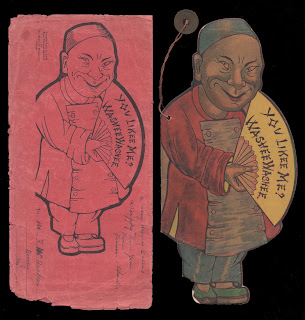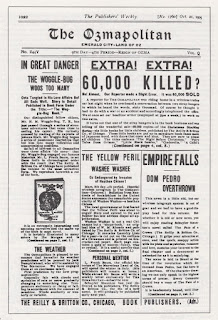The booklet had its own mailing envelope, printed with the cover design and the address of the publisher, Reilly & Britton. This example is inscribed with "A very merry Xmas and a Happy New Year!"
The book itself is intended to be used when sending out laundry to the cleaner, with appropriate spaces for indicating quantities of clothing articles. At the bottom of each page is a quote from a variety of sources, or as the title page says, "wise saws and modern instances”.
As an institution, the Chinese laundry has disappeared; but during the time period when this book was published, Chinese laundries could be found in every town across America. This was due to restrictive laws that blocked Asian immigrants from pursuing better jobs. The Chinese Exclusion Act wasn’t repealed until 1943.
While the book is built around the kind of comic ethnic stereotype that
is found offensive today, the
advertising piece printed in The Publisher's Weekly adds insult to injury. This took the form
of the front page of the Ozmapolitan, the newspaper of Oz, and refers to
"The Yellow Peril" and "Oz endangered by Invasion of Heathen Chinee". It then goes on to explain that the Washee-Washee is simply a popular novelty book.
The same page advertises L. Frank Baum’s The Wogglebug Book, notorious for its use of humor based on ethnic stereotypes. In a rather bizarre reference, the Wogglebug is said to have been inspired in his exploits by the adventures of Johann Hoch; Hoch was the notorious Bluebeard murderer, who was captured in 1905 and executed in 1906. Other items on the page include The Christmas Stocking Series, (under the bold headline of 60,000 KILLED?) and Baum’s pseudonymous book The Fate of a Crown.
The image of the Ozmapolitan shown above is taken from the Baum Bugle. I don’t know if this was simply created as an advertising page for The Publisher’s Weekly, or if an actual paper was produced. In any case, it's quite a page of questionable content!







No comments:
Post a Comment